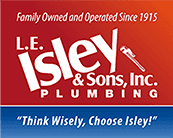How to Choose the Best Water Softener for Your Home
Having a water softener is essential for improving your home’s water quality. Whether you’re replacing an old water softener or buying one for your new home, it’s crucial to choose the right system. That’s why Isley Plumbing has created a list of tips to help guide you through the process. Here are six things to keep in mind when shopping for a new water softener.
#1 Water Hardness Level
Before buying a water softener, it’s important to know exactly how hard your water at home is. The best way to do this is by using a water hardness test strip to determine the hardness level. These can be purchased at any local home improvement store. Knowing your home’s water hardness level will help you choose the proper type of water softener.
#2 Water Softener Size
Water softeners vary in size, so it’s important to choose the right one for your home. Determine what size you need by calculating the average number of gallons your household uses per day. To do this: multiply the number of people in your household by the average number of gallons used per day, which is usually around 75. Then, multiply that number by the hardness level you found when you tested your water. Use this information as a guide when choosing your new water softener.
#3 Water Softener Type
There are three main types of water softeners: ion-exchange softeners, dual-tank softeners, and salt-free softeners. Which one do you need? Here’s a breakdown for each.
- Ion-exchange water softeners substitute sodium ions for the ions of magnesium, calcium, iron and other hard minerals. This type of water softener adds small amounts of sodium to your drinking water. So, if you are trying to reduce sodium in your diet, the ion-exchange softener may not be ideal pick for you.
- Dual-tank water softeners use the ion exchange method and contain two resin tanks. One tank is always kept available for use, while the other goes through a regeneration cycle. This ensures that your household can access soft water any time it needs. This option tends to be more expensive, but it does appeal to homes with a higher water usage.
- Salt-free water softeners use potassium-chloride salt instead of sodium. Potassium is considered the most environmentally friendly option, but it is more expensive than sodium.
#4 Cost
Depending on the size, type, and features, you can expect to pay anywhere between $1,000 to $4,000 for a water softener. Take time to shop around for the best system for your budget.
#5 Installation
Now that you’ve selected your water softener, it’s time to call a professional to help you install the system. A quick Google search will show you all of the HVAC companies within your area. How do you choose the best service? Look to Isley Plumbing for high customer satisfaction. By choosing Isley Plumbing over a big box store, you’ll receive the reliable, high quality service that only a century old, family-run business could offer you.
#6 Maintenance
No matter which water softener you choose, it’s important to keep up with routine maintenance to ensure your system is working properly. When your water softener needs cleaned or repaired, contact Isley Plumbing for efficient and effective service.
Choosing the right water softener for your home doesn’t have to be scary or difficult. Isley Plumbing is here to support you along the way. Have questions or need to schedule an installation? Call us at 317-420-4006 or reach out online today! Our team is happy to help.

